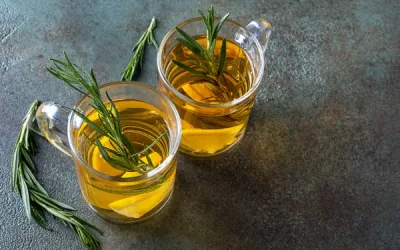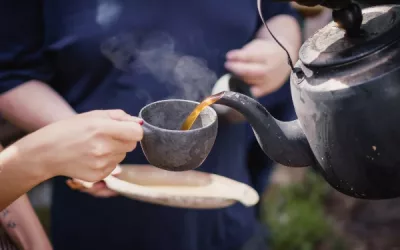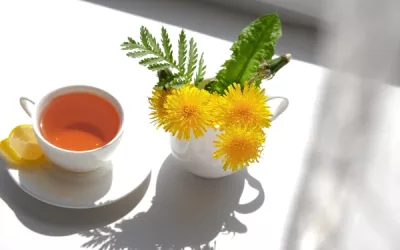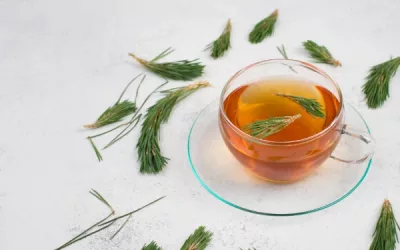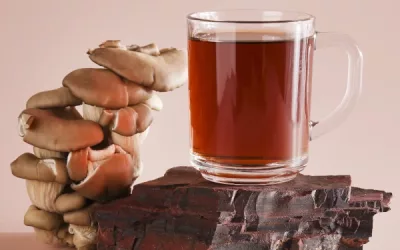Did you know that golden tea, revered for its vibrant hue and powerful health benefits, has roots tracing back thousands of years in Ayurvedic medicine? This ancient brew, primarily made from turmeric, not only tantalises the taste buds but also offers a plethora of wellness advantages. In this guide, we’ll dive into its history, explore recipes and preparation methods, and uncover its myriad health benefits. Whether you’re new to golden tea or looking to enhance your routine, this article will provide you with all the insights you need.
Table of Content
- What is golden tea and its historical significance?
- How do you prepare golden tea?
- What are the best milk alternatives for golden tea?
- How often should you drink golden tea?
- What variations can be made to golden tea?
- What are the common misconceptions about golden tea?
- How can you incorporate golden tea into your daily routine?
- Conclusion
What is golden tea and its historical significance?
Golden tea, also known as turmeric tea, has roots that stretch deep into history, particularly within Ayurvedic medicine. Ayurveda, a traditional system of medicine originating in India, has long celebrated golden tea for its myriad of health benefits.
This vibrant, golden-hued beverage gets its colour and primary benefits from turmeric, a spice renowned for its medicinal properties. For centuries, people have consumed this tea to boost their health, from improving digestion to enhancing overall well-being.
The tea’s significance is multifaceted. It is not only a staple in Ayurvedic practices but also holds cultural importance across various regions. Turmeric, the main ingredient, is considered a superfood due to its active compound curcumin, known for its anti-inflammatory, antioxidant, and anti-microbial properties.
Traditional uses of this tea span from being a soothing drink for colds and sore throats to a powerful detoxifier for the body.
What are the main ingredients of golden tea?
Golden tea’s delightful taste and health benefits come from its simple yet powerful mix of ingredients.
- Turmeric: The star of the show, providing the golden colour and numerous health advantages.
- Black Pepper: Enhances the absorption of curcumin from turmeric.
- Ginger: Adds a spicy kick and aids digestion.
- Cinnamon: Offers a sweet, warming flavour and has anti-inflammatory properties.
- Honey: Natural sweetener that soothes the throat and boosts immunity.
- Coconut Milk: Provides a creamy texture and healthy fats.
This mix creates a potent drink that not only tastes good but also supports your health in various ways.
How has golden tea been used in different cultures?
Golden tea’s use is not confined to one region but spans various cultures, each adding its unique touch.
- India: In Ayurveda, golden tea is a common remedy for colds, inflammation, and digestive issues.
- China: Some traditional Chinese medicine practices incorporate turmeric for its medicinal benefits.
- Middle East: Turmeric is often used in herbal teas for its healing properties.
- Western World: Recently, it has gained popularity in health and wellness circles for its anti-inflammatory benefits.
From soothing colds in India to being a trendy wellness drink in the West, this type of tea has found its place in many homes globally.
Why is turmeric considered a superfood?
Turmeric’s superfood status comes from its star component, curcumin, which packs a powerful punch.
- Anti-inflammatory: Curcumin helps reduce inflammation in the body.
- Antioxidant: It combats oxidative stress and free radicals.
- Anti-microbial: Keeps infections at bay.
- Supports digestion: Helps with gut health and digestion.
- Boosts immunity: Strengthens the body’s natural defences.
These properties make turmeric not just a spice but a potent tool in promoting health and wellness.
In the ancient city of Jaipur, India, there’s a festival celebrating turmeric called “Haldi Festival.” This festival showcases the cultural significance of turmeric, not just in culinary practices but also in spiritual and health aspects. People apply turmeric paste on each other, symbolising purification and protection from evil spirits.
Once, when I was feeling under the weather, a friend introduced me to it. The warming spices and creamy texture felt like a hug in a mug. It quickly became my go-to remedy for cold days and those times when I needed a little pick-me-up.
Now, it’s a staple in my kitchen, reminding me that sometimes, the best remedies come from nature.
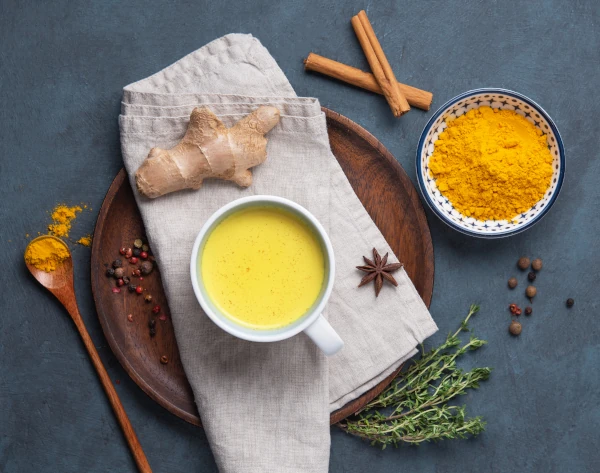
How do you prepare golden tea?
Golden tea, also known as turmeric tea, is a popular beverage recognised for its potential health benefits. This tea is traditionally made with turmeric, a spice celebrated for its anti-inflammatory and antioxidant properties.
Preparing it can be simple, yet there are various delicious ways to enjoy it.
To help you explore different recipes, I’ve created a table below. Each row represents a unique recipe, detailing ingredients, preparation time, and serving suggestions. This table will guide you through various flavours and methods to make your experience with it enjoyable and tailored to your preferences.
| Recipe Name | Ingredients | Preparation Time | Serving Suggestions |
|---|---|---|---|
| Classic Golden Tea | Turmeric powder, black pepper, water, honey | 10 minutes | Serve hot with a slice of lemon |
| Creamy Coconut Golden | Turmeric powder, black pepper, coconut milk, honey | 15 minutes | Best enjoyed warm on a cosy evening |
| Ginger Golden Tea | Turmeric powder, black pepper, grated ginger, water, honey | 12 minutes | Pair with a light snack in the morning |
| Spiced Golden Tea | Turmeric powder, black pepper, cinnamon, cardamom, water, honey | 15 minutes | Perfect for chilly afternoons |
| Almond Golden Latte | Turmeric powder, black pepper, almond milk, honey | 15 minutes | A great dairy-free option for any time |
| Minty Golden Tea | Turmeric powder, black pepper, fresh mint leaves, water, honey | 10 minutes | Refreshing and ideal for hot days |
| Golden Chai Tea | Turmeric powder, black pepper, chai spices (cinnamon, cardamom, cloves), water, honey | 20 minutes | Enjoy as a relaxing afternoon treat |
To use and understand the table, select a recipe name that appeals to you. Gather the listed ingredients, follow the preparation time, and consider the serving suggestions for the best experience.
What are the health benefits of golden tea?
Golden tea is not just a tasty beverage; it’s packed with a variety of health benefits that make it a popular choice among those who prioritise natural remedies and holistic living.
- Anti-Inflammatory Properties: Turmeric contains curcumin, which helps reduce inflammation in the body.
- Antioxidant Boost: Curcumin is also a powerful antioxidant that can protect your cells from damage.
- Improves Digestion: Golden tea can aid digestion and alleviate bloating and gas.
- Supports Immune Health: The antioxidants and anti-inflammatory compounds can bolster your immune system.
- Enhances Skin Health: Regular consumption may give your skin a healthy glow due to its detoxifying effects.
These benefits make it a wonderful addition to your daily routine. The combination of turmeric with black pepper improves curcumin absorption, enhancing these effects.
What are some variations in golden tea recipes?
There are several ways to enhance your golden tea, depending on your taste preferences and dietary needs.
- Coconut Milk: Adds a creamy texture and a subtle sweetness.
- Ginger: Provides a spicy kick and additional digestive benefits.
- Cardamom and Cinnamon: Infuse warm, aromatic flavours.
- Almond Milk: Offers a dairy-free, nutty alternative.
- Mint Leaves: Introduce a refreshing twist.
- Chai Spices: Combine traditional chai spices for a rich, spiced version.
These variations allow you to customise your golden tea, making it versatile for different times of the day and types of meals. Experiment with these ingredients to find your favourite combination.
In the time of ancient India, turmeric was highly treasured. Legend has it that the famous Indian Queen, Rani Padmini, used to drink golden tea regularly as part of her beauty regime. She was known for her radiant skin and robust health, attributes she credited to this golden elixir.
Her royal kitchen would prepare the finest turmeric blends, incorporating exotic spices to enhance its flavour and health benefits. This practice has carried on through generations, proving the timelessness of it’s appeal.
I remember the first time I tried making it. It was a chilly evening, and I was feeling a bit under the weather. I followed a simple recipe with turmeric, black pepper, and honey. The warmth and soothing flavour of the tea were incredibly comforting.
Since then, I’ve tried various recipes, each bringing new dimensions to this wonderful drink. It’s become a staple in my kitchen, offering a daily dose of wellness and comfort.
What are the best milk alternatives for golden tea?
Golden tea, also known as turmeric latte, has exploded in popularity. And rightly so—it’s a tasty, anti-inflammatory powerhouse! But let’s get real: not everyone’s down with the moo juice. So, what’s a tea lover to do? Enter milk alternatives.
Switching up the milk in your golden tea can transform the experience. Whether you’re lactose intolerant or just fancy a change, the world of milk alternatives is ready to embrace your taste buds. Think coconut, almond, oat, soy, and cashew milk—they’ve got your back.
Which milk alternative is the creamiest for golden tea?
If we’re talking creaminess, cashew milk takes the crown. This silky superstar boasts a rich texture that brings an unparalleled decadence to your golden concoction.
- Cashew Milk: Thick and velvety, it feels like it should come with a luxury tax. If golden tea had a spa day, this would be its massage.
- Oat Milk: Close second. Its natural starches lend a creamy, frothy vibe that’s perfect for latte lovers.
- Coconut Milk: Plenty creamy, especially the canned version. It’s tropical and luxurious but can be a bit overwhelming.
- Soy Milk: Reliable and moderately creamy, it balances well without stealing the spotlight.
- Almond Milk: Light and nutty, it doesn’t quite reach the creamy echelon but lends a different, gentle smoothness.
So, if you’re after a thick, indulgent experience, pour yourself some cashew milk and thank us later.
Are there any health benefits to using certain milk alternatives?
Of course! Each milk alternative brings its own set of perks.
- Cashew Milk: Loaded with good fats and minerals like magnesium and iron, it’s a nutritional secret weapon.
- Oat Milk: Packed with fibre and beta-glucans, it’s a heart-healthy choice that can lower cholesterol.
- Coconut Milk: Rich in Medium Chain Triglycerides (MCTs), it’s great for boosting metabolism and energy.
- Soy Milk: High in protein and contains all nine essential amino acids, a vegan’s dream.
- Almond Milk: Low in calories and high in vitamin E, it’s a skin-friendly option.
In a nutshell, each alternative carries its own health badge of honour, making them all worthy companions to your golden tea.
How do different milk alternatives affect the flavour of golden tea?
Flavour’s a biggie. Depending on your pick, you can subtly (or not-so-subtly) shift the flavour profile of your tea.
- Cashew Milk: Mild and buttery, it enhances the tea’s natural richness without overpowering it.
- Oat Milk: Slightly sweet with a gentle oaty note, it complements the earthy turmeric while adding a hint of sweetness.
- Coconut Milk: Brings a distinct coconutty flair, it’s like a tropical holiday in a cup. Just make sure you like coconut!
- Soy Milk: Fairly neutral with a slight beany taste, it lets the spices in your golden tea shine.
- Almond Milk: Subtly nutty, it brings a unique flavour while keeping things light.
So, by tweaking your milk alternative, you can play chef and create a brew that’s uniquely you.
Back in the early 1900s, when Gandhi was protesting British rule in India, he used to make a point about the simplicity of living and the importance of natural remedies. He once walked through villages advocating the use of local herbs and spices for health.
It’s said he favoured natural, homemade remedies over Western medicine. Imagine if he had a cup of golden tea with him—a blend of local turmeric, ginger, and a splash of simple, yet nutrient-rich coconut milk.
It would’ve been the perfect emblem of his philosophy: natural, wholesome, and deeply rooted in tradition. Plus, it would have been a delightful break from all that salt.
How often should you drink golden tea?
Ah, golden tea, that magical elixir brimming with goodness! Who wouldn’t want to sip on it all day? But hold your horses, tea lover. As with many things in life, moderation is key. Drinking it every day is might be a good idea, but it’s not an all-you-can-drink free-for-all.
The ideal frequency for golden tea is about one to two cups per day. Drinking it daily can offer various health benefits, but going overboard might stir up some unnecessary trouble.
Imagine feeling queasy or having an upset stomach because you couldn’t keep your enthusiasm in check. Let’s avoid that scenario.
Is there a maximum amount of golden tea one should consume?
Absolutely! Please don’t assume that topping off an IV drip of golden tea is the way to go. Experts recommend sticking to:
- 1-2 cups per day, which should be enough to get the benefits without turning into a golden tea monster.
- Watch for any signs of overconsumption like nausea or stomach issues.
- If you’re new to this golden goodness, start with just one cup a day and see how your body feels.
- Listen to your gut; literally, if it starts complaining, ease off the golden tea throttle.
- Consult your doctor, especially if you have pre-existing conditions or are on medication.
While bingeing on Netflix is acceptable, bingeing on golden tea is not. It’s all about balance.
What is the best time of day to drink golden tea?
Now, timing is everything. Drinking golden tea at the right time can amplify its benefits. Follow these guidelines:
- Morning: Drinking it on an empty stomach can kickstart your metabolism.
- Evening: Great for winding down after a long day, helping you relax.
- Post-meal: Useful for aiding digestion if you’ve had a heavy meal.
- Pre-sleep: Lovely nightcap due to its calming properties.
Golden tea is a versatile drink, but no need to set an alarm for it. Find a time that works best for you and your schedule.
Can golden tea be consumed safely every day?
Absolutely, golden tea can safely become a part of your daily routine as long as you stick to the golden rule: moderation. Drinking it every day can help with inflammation, digestion, and even support your immune system.
- Keeps chronic inflammation at bay, useful for those with arthritis or similar conditions.
- Aids in better digestion, helping with that pesky bloating.
- Supports immune health, an ally during flu season.
- Contains antioxidants, which are fabulous for overall wellness.
- Has calming properties, helpful for those with anxiety or insomnia.
With its myriad of benefits, golden tea can certainly find a daily spot in your life. But remember, it’s not a silver bullet. Pair it up with a balanced diet and healthy lifestyle for the best results.
Speaking of golden elixirs, did you know that ancient warriors in India would have a blend similar to golden tea before heading into battle? According to historical texts, a concoction called “haldi doodh” (milk with turmeric) was consumed for its believed healing and protective properties.
This ancient remedy has transcended time and remains a staple in Indian households. So, think of yourself as a modern-day warrior, armed with a cup of golden tea, battling the stresses of everyday life. Cheers to that!
What variations can be made to golden tea?
Golden tea, also known as turmeric tea, can be jazzed up in numerous ways. You can add spices, sweeteners, and herbs to either ramp up the flavour or boost the health benefits. Honestly, it’s like a blank canvas waiting for your creative touch. Imagine golden tea as your health potion, but with a little flair.
Adding spices like cinnamon or cloves can make your golden tea a tantalising treat. Sweeteners, such as honey or stevia, can transform it into a more inviting cup. And don’t even get me started on herbs like ginger or peppermint; they can turn your golden tea into a veritable kitchen masterpiece.
What spices can be added to enhance golden tea?
To jazz up your golden tea, consider adding spices that amplify its inherent benefits and also add a flavourful punch. Remember, not all heroes wear capes; some come in spice jars.
- Cinnamon: Acts like a warm hug from a spice jar. It pairs beautifully with turmeric and adds a sweet-spicy note.
- Cloves: These tiny powerhouses pack a punch in terms of flavour and antioxidants.
- Black Pepper: Enhances the bioavailability of curcumin, making the anti-inflammatory benefits of turmeric more effective.
- Cardamom: Adds a sweet and zesty flavour that gives your tea an exotic twist.
- Nutmeg: A tiny pinch of nutmeg can add depth and a warming quality that makes golden tea even more comforting.
You can sprinkle these spices into your tea while it’s brewing or add them afterwards. Either way, it’s like sending your taste buds on a mini-vacation.
Can sweeteners be used in golden tea, and which are best?
Absolutely, sweeteners can totally find a home in your cup of golden tea. The trick is to choose ones that complement turmeric’s earthy flavour without overshadowing it.
- Honey: Naturally sweet and chock-full of antioxidants. It’s like the Beyoncé of sweeteners – smooth and golden.
- Maple Syrup: Offers a robust, almost caramel-like sweetness that could make even sceptics fall in love with golden tea.
- Stevia: If you’re watching your sugar intake, stevia is a great option. It sweetens your tea without adding calories or carbs.
- Coconut Sugar: Gives a light, caramel flavour and doesn’t spike your blood sugar as much as regular sugar.
- Agave Nectar: A plant-based option that’s slightly less viscous than honey with a mild taste.
Adding sweeteners can make your golden tea more palatable, especially if you’re new to the whole turmeric scene. Just a little drizzle or spoonful is usually enough to transform the experience.
How do other herbs interact with turmeric in golden tea?
Turmeric doesn’t mind sharing the stage with other herbs. In fact, certain herbs can not only enhance the flavour but also amplify the health benefits.
- Ginger: A spicy kick that can help with digestion. Feels like a zesty party in your cup.
- Peppermint: Adds a refreshing note and works wonders for your digestive system.
- Lemongrass: Offers a citrusy tang that pairs well with turmeric, providing additional antibacterial properties.
- Tulsi (Holy Basil): A revered herb in Ayurveda that can help reduce stress and improve immunity.
- Ashwagandha: Known for its adaptogenic properties, meaning it helps the body manage stress, making your golden tea a super brew.
By combining these herbs with turmeric, you’re not just making a drink; you’re concocting a health elixir that’s as tasty as it is beneficial.
One fascinating story about the power of herbs and spices dates back to when ancient Ayurvedic practitioners used turmeric in various forms to treat an array of ailments. In those days, herbs such as ashwagandha and ginger were also included to balance the doshas (the body’s natural energies).
This ancient knowledge was passed down through generations and remains a cornerstone of holistic healing in modern times. It’s like inheriting a time-tested recipe that’s proven to be effective over thousands of years.
Cheers to drinking a sip of history every time you enjoy your spiced-up golden tea!
What are the common misconceptions about golden tea?
Golden tea—sounds like something straight out of an ancient treasure chest, doesn’t it? This spicy, golden concoction is gaining popularity, but as with all things that shine, there are a few misconceptions that need debunking.
First up, turmeric, the star ingredient in golden tea, isn’t a miracle worker. Many people think it can single-handedly cure all ailments—from a common cold to arthritis to world peace. Turmeric does have anti-inflammatory and antioxidant properties, but calling it a panacea would be stretching it. It’s like saying your granny’s soup can cure a broken leg. Nice try, but no cigar.
Next, there’s the myth that golden tea is difficult to prepare. It’s not rocket science, folks. You don’t need to be a top-tier chef. A pinch of turmeric, a dash of black pepper, a dollop of honey, and some plant-based milk—boom, you’ve got yourself a cup of golden goodness.
People imagine elaborate rituals or secret handshakes, but the reality is refreshingly straightforward.
Could golden tea take over your medicine cabinet? Not quite. While it’s a natural remedy with remarkable benefits, it won’t replace your prescription drugs. It’s more of a wellness supplement than a substitute for actual medical treatment.
Think of it as the trusty sidekick rather than the superhero.
Lastly, there’s confusion about who can safely drink it. Golden tea is generally safe, but it’s not universally golden. Pregnant women, people on certain medications, and those with bile duct obstructions, gallstones, or liver disease should probably skip it.
Nothing’s for everyone, not even golden tea.
Is golden tea a substitute for medication?
Short answer: Nope. Golden tea isn’t a magical potion. It’s an excellent supplement with anti-inflammatory and antioxidant properties, but it shouldn’t replace medication prescribed by your doctor.
- Anti-inflammatory benefits: Great for managing minor ailments.
- Good for general wellness: A natural boost for your immune system.
- A natural remedy: Helpful, but not a replacement for pharmaceuticals.
- Supportive role: Best used alongside prescribed treatments.
- Consult healthcare providers: Always talk to your doctor before making changes.
Relying solely on golden tea for serious health issues is like using a band-aid for a broken arm. It’s great for adding a layer of wellness but keep it real and science-backed.
Can everyone drink golden tea?
Not everyone should be sipping this golden elixir like it’s nectar from the gods. While generally safe, there are notable exceptions and considerations.
- Pregnant women: Should consult their doctor.
- People with gallstones: Could experience worsening symptoms.
- Those on blood thinners: Turmeric can interact with these meds.
- Diabetes patients: Might see an effect on blood sugar levels.
- Those with sensitive stomachs: Turmeric can be a bit harsh.
Golden tea is kind of like attending a heavy metal concert. Some people will love it, but some will find it’s not their cup of tea—literally.
Are there any negative side effects of golden tea?
Even the sunniest of days can have some clouds. Golden tea, for all its benefits, has its share of potential side effects, particularly when consumed in excess or if predisposed to specific conditions.
- Stomach cramps: Not a fan of spicy food? Prepare for possible tummy troubles.
- Risk of kidney stones: High oxalate content in turmeric could be problematic.
- Blood sugar levels: Potential to lower blood sugar too much in diabetics.
- Interference with medications: Always a player in the drug interaction game.
- Nausea and dizziness: Excess intake could make your head start to spin.
While golden tea is a health boon for many, it’s essential to heed medical advice and consume it responsibly. Moderation is always the secret spice in any recipe.
Remember the days of yore, back in ancient India, where turmeric was as valuable as gold? Indian warriors consumed turmeric mixed with milk for its healing benefits after fierce battles. It wasn’t a cure-all, but it aided in faster recovery.
Much like today’s golden tea, its value wasn’t in working miracles, but in providing genuine, albeit modest, support to your health regimen.
How can you incorporate golden tea into your daily routine?
Golden tea, also known as turmeric tea, can easily become a staple in your daily routine. Incorporating this delightful and health-boosting brew can be a breeze with a few practical steps. Whether it’s in the morning to kickstart your day, in the evening as part of your wind-down routine, paired with your meals, or consumed mindfully, golden tea offers many opportunities to enhance your lifestyle.
Imagine starting your day with a warm mug of golden tea. It’s like having a liquid sunshine boost to sweep away any grogginess. This can quickly become the cornerstone of your morning ritual, alongside other feel-good habits like stretching or a quick meditation.
Come evening, a soothing cup of golden tea can become your go-to for a calming ritual before bed, helping you to unplug from the day’s chaos and promoting a restful night’s sleep.
Pairing golden tea with meals is another excellent strategy. Its warm, slightly spicy flavour can complement various dishes. You can sip it alongside breakfast or lunch, or even mix it into smoothies, soups, or curries for an added health kick.
And of course, the mindful consumption of golden tea means savouring every sip, being present in the moment, and enjoying the myriad of benefits it brings.
What are some creative ways to enjoy golden tea?
Yes, boiling water and tossing in some turmeric isn’t the only way to get your golden tea fix. Let’s get innovative!
- Golden Latte: Swap your regular coffee with a creamy golden latte. Just add some almond milk, a hint of honey, and a dash of black pepper to your turmeric tea.
- Smoothie Boost: Blend your golden tea with fruits like mango, pineapple, or banana for a tropical smoothie that’s as nutritious as it is delicious.
- Golden Tea Popsicles: Freeze your golden tea with a touch of coconut milk and maple syrup for a refreshing and healthy summer treat.
- Spice it Up: Add other spices like ginger, cinnamon, or cardamom for a chai-like experience that’s robust and flavourful.
- Golden Soups: Pour some golden tea into your favourite soup recipes for an extra dose of health benefits and a surprising twist in flavour.
Getting creative with golden tea not only adds variety to your consumption but also maximises the health benefits. You don’t need to stick to the traditional preparation, diversify!
How can golden tea complement a healthy diet?
Golden tea is not just a tasty treat; it’s a powerhouse of nutrients that can seamlessly complement a well-balanced diet.
- Anti-inflammatory: Turmeric, the star ingredient, is renowned for its anti-inflammatory properties, making golden tea a great choice for reducing inflammation.
- Digestive Health: Sipping on golden tea can aid digestion, easing bloating and discomfort, and boosting gut health.
- Antioxidant Boost: Rich in antioxidants, golden tea helps combat oxidative stress, protecting your cells from damage.
- Low-calorie Beverage: It’s a low-calorie drink that still packs a punch in flavour and vitamins, helping you cut down on sugary sodas and energy drinks.
- Immunity Support: Golden tea can enhance your immune system, thanks to turmeric’s antibacterial and antiviral properties.
Consider adding a daily cup to your meals, and you’ll quickly see how it enhances your overall diet.
What role does golden tea play in relaxation and stress relief?
Golden tea isn’t just about physical health; it’s also a fantastic ally in maintaining mental wellbeing, relaxation, and stress relief.
- Calming Effects: The warm, soothing nature of golden tea can help to relax the mind and body, reducing stress levels.
- Mood Booster: Turmeric contains curcumin, which is known for its mood-enhancing properties and can potentially alleviate symptoms of depression.
- Sleep Aid: Enjoying a cup before bedtime can promote better sleep, making it a healthier alternative to traditional nightcaps.
- Mindfulness Practice: The process of preparing and sipping on golden tea can become a moment of mindfulness, helping to centre the mind and promote inner peace.
- Reduce Anxiety: The ritual of drinking golden tea can become a comforting routine that reduces feelings of anxiety.
Incorporating this calming beverage into your life could be the secret ingredient to a more relaxed and stress-free existence.
In 16th century India, the renowned emperor Akbar was known to consume a daily concoction of herbs, which included turmeric, to maintain his vigour and mental clarity. This golden brew was said to keep his mind sharp and his health robust.
Although golden tea as we know it might not have been on his menu, the principles of harnessing turmeric’s power were well understood. So, as you sip on your golden tea, you’re continuing a rich tradition that’s centuries old – and one fit for royalty.
Conclusion
As I reflect on the plethora of insights and benefits surrounding golden tea, it becomes clear just how significant this traditional beverage is in promoting holistic health. We explored its rich history rooted in Ayurvedic practices, with turmeric standing out as a vital superfood that has captivated numerous cultures.
Through a detailed examination of its preparation methods, various delicious recipes emerged—each showcasing the versatility and nourishment golden tea offers.
Moreover, the health benefits we discussed—from its potent anti-inflammatory properties to its role in supporting digestive health and boosting immunity—highlight why integrating golden tea into our diets can be a transformative decision.
It’s not merely a comforting drink; it’s a potent ally in our pursuit of well-being. We also uncovered the intriguing realm of milk alternatives, noting how choices like coconut or almond milk elevate both the creaminess and flavour of golden tea, enhancing the overall experience.
However, consistency is key. I’ve learned that moderation and mindful consumption are crucial to maximising its benefits, preventing potential side effects from overindulgence. We’ve debunked common misconceptions, recognising that while golden tea is a fantastic addition to our wellness routines, it should not replace conventional medication or offer unrealistic cures.
As a loving advocate for holistic living, I encourage you to experiment with different variations and creative pairings of golden tea as you weave it into your daily rituals. Could you envision beginning your mornings with a soothing cup or integrating it into your evening wind-down routine?
In the ever-evolving journey of health, golden tea is more than just a beverage; it is a meaningful ritual that invites us to pause, reflect, and nourish ourselves. Remember the words of Ayurveda: “What we eat is what we are.”
So, as you sip that golden concoction, think about how you are nurturing not just your body but your mind and soul as well. May your exploration of golden tea lead you to not only better health but also deeper moments of tranquillity and delight.
Resources
- Tea and depression
- Health Benefits of Turmeric
- Curcumin: A Review of Its’ Effects on Human Health
- Turmeric and Its Major Compound Curcumin on Health: Bioactive Effects
- Systematic review Turmeric / curcumin and health outcomes: A meta-analysis
- Beneficial effects of green tea: A literature review
- Turmeric benefits: A look at the evidence
- Seven-day Green Tea Supplementation Revamps Gut Microbiome and Caecum
- Turmeric: A review of its’ effects on human health


